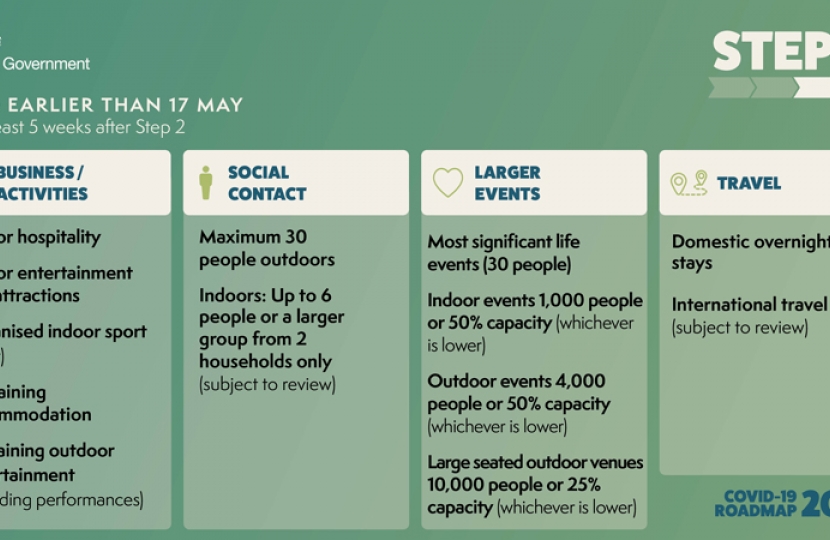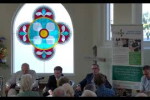
The government has announced a 4-week pause at Step 3 on the roadmap to release Covid restrictions. Step 3 restrictions remain in place, and you should follow the guidance on this page, which explains what you can and cannot do.
It is expected that England will move to Step 4 on 19 July, though the data will be reviewed after 2 weeks in case the risks have reduced. The government will continue to monitor the data and the move to Step 4 will be confirmed one week in advance.
However, some restrictions will change on 21 June. From 21 June, there will be changes to the rules on:
- weddings and civil partnership ceremonies and wedding receptions or civil partnership celebrations
- commemorative events following a death such as a wake, stone setting or ash scattering
- large events pilots
- care home visits
- domestic residential visits for children
Commenting, James said:
"This delay in moving to step four of the roadmap due to the data on the Delta variant is disappointing although I welcome the lifting of the cap on wedding guests and that care home residents will no longer have to isolate after visits out. While the delay in removing other restrictions is unwelcome for so many people and businesses, this will provide an opportunity to accelerate the vaccine programme and avoid lifting restrictions only to have to reimpose them."
Weddings
From 21 June, the rules on the number of people who can attend a wedding or civil partnership ceremony, a wedding reception or civil partnership celebration, and a commemorative event following a funeral such as a wake, stone setting or ash scattering, will change.
The number of people who can attend these events in a COVID-Secure venue or other venue (such as a garden of a private home) will be determined by how many people a venue can safely accommodate with social distancing measures in place, including guests of all ages and anyone working at the event.
A marquee or other structure in a private garden of a private home must have at least 50% of its walled area open at any time for it to be classed as “outdoors”, and for the limit based on safe capacity to apply.
Inside private homes, and in enclosed structures in gardens of private homes, weddings can only be held in line with broader social contact rules of up to 6 people or 2 households, except in the case of an urgent marriage where one of those getting married is seriously ill and not expected to recover (‘deathbed weddings’). These can take place in private dwellings with up to 30 people.
Some restrictions on these events will remain in place to enable them to take place safely. This includes table service requirements, face coverings, social distancing, and restrictions on dancing and singing, as at present.
For those organising weddings in gardens of private homes or on private land, you will need to make your chosen venue as safe as possible. If you plan on having more than 30 people, you must complete a COVID-19 risk assessment to determine how many attendees will be able to attend, and follow Government guidance to make the event as safe as possible. Guidance on how to complete the risk assessment will be provided.
Guidance on wedding and civil partnership ceremonies, receptions and celebrations has been updated.
Commemorative events
Guidance on arranging or attending a funeral during the coronavirus pandemic will be updated by 17 June.
Guidance on what you need to do if you’re planning a wedding or civil partnership or funeral, wake or commemoration in venues such as gardens or marquees on private land has also been published.
Large event pilots
A limited series of pilot events will take place to produce additional evidence on reopening events safely. Attendees will need to show proof of vaccination or a recent negative test.
This will include some UEFA EURO 2020 matches at Wembley and a small number of other sports, arts and music performances. The full list of pilots, and further details about the events, will be announced shortly.
Care Home visits
From 21 June some changes will be made to visits in and out of care homes.
For visits in to care homes, all care home residents will be able to nominate an essential care giver. These essential care givers will be able to visit the care home resident, even if the resident is isolating.
In most cases, residents who go on a visit out of a care home will no longer need to isolate for 14 days when they return. Residents returning from some higher risk visits out of the care home, such as an overnight stay in hospital, will still be required to isolate. Decisions on risk will be made following a risk assessment by the care home for each visit out.
The guidance on care home visiting will be updated by 17 June.
Domestic residential visits for children
From 21 June, out-of-school settings can organise domestic residential visits for children in consistent groups of up to 30 children. This replaces the current limit of 6 people or 2 households.
A complete summary of the rules and restrictions can be found here.

